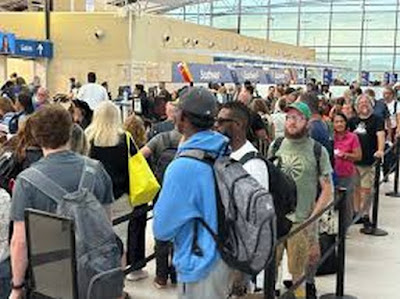Travel Chaos at STL: Thousands Stranded as Delays Erupt at St. Louis Lambert International Airport
St. Louis, MO - The usually bustling hub of St. Louis Lambert International Airport (STL) descended into chaos on Sunday, July 13, 2025, as a massive surge in travelers, coupled with widespread flight delays, overwhelmed airport infrastructure. Thousands of passengers, many returning from a large religious convention in the city, found themselves facing extraordinary wait times, missed flights, and a frustrating scene that spilled well beyond the terminal doors.
 |
| (Picture: firstalert4.com) |
The unprecedented crowds and operational snags created a logistical nightmare, with lines for check-in and security stretching out onto the roadway near Terminal 2. The situation, characterized by frustrated travelers and exhausted airport staff, highlighted the fragile nature of modern air travel and the ripple effect that significant delays can have on a system already strained by high demand.
The Perfect Storm: Why St. Louis Airport Was Overwhelmed
The disruption at STL was a confluence of factors, primarily driven by the conclusion of a major Seventh Day Adventist conference that had drawn thousands of attendees to St. Louis. As these attendees attempted to depart simultaneously, the airport experienced one of its busiest days of the year.
While a significant influx of passengers is expected during major events, the sheer volume, combined with an underlying pattern of flight delays and potential air traffic control issues, creates a bottleneck that the airport and airlines struggle to manage.
Local news reports from KSDK 5 On Your Side described scenes of police assistance with crowd control and passengers becoming increasingly desperate as they realized they would miss their scheduled departures. The overflow of travelers onto the drop-off lanes near Terminal 2 was a stark visual representation of the crisis, as frustrated individuals stood outside the building, unable to even begin the check-in process.
Navigating the Delays: What Travelers Should Know
For travelers caught in this and similar situations across the United States, understanding their rights and options is crucial. While airlines in the US are not legally mandated to compensate passengers for delays caused by external factors like weather or air traffic control, they do have obligations to assist customers when the disruption is within their control, such as mechanical issues or staffing shortages.
Know Your Rights and Options:
- Refunds for Significant Delays: If a flight is significantly delayed (generally defined by the Department of Transportation as three hours or more for domestic flights or six hours for international flights) and a passenger chooses not to travel, they are entitled to a full refund, even on non-refundable tickets.
- Rebooking Alternatives: Airlines are typically required to rebook passengers on the next available flight with open seats, often at no additional charge, if their original flight is significantly delayed or canceled.
- Essential Amenities: For lengthy delays, airlines often provide amenities such as food and drink vouchers, access to communication (phone calls, emails), and, if delayed overnight, hotel accommodation and transportation.
The St. Louis situation underscores the importance of proactive measures. Travelers should continuously monitor their flight status through airline apps or websites, and, if facing a disruption, immediately contact the airline's customer service or utilize airport kiosks and gate agents for rebooking.
Lessons Learned: Preparing for Future Travel
The scene at St. Louis Lambert International Airport on Sunday highlights the volatility of modern air travel. While the sheer volume of post-convention travelers was a primary catalyst, the incident serves as a reminder that travelers should always prepare for the unexpected.
Tips for Stress-Free Travel (Even During Delays):
- Arrive Early: Arriving well in advance of a flight is always recommended, but especially during peak travel periods or when large events are concluding in the area.
- Pack Smart: Keep essential items, medications, and chargers in a carry-on bag in case checked luggage is inaccessible due to delays.
- Utilize Technology: Leverage airline apps for mobile check-in, real-time flight updates, and notifications regarding delays or cancellations.
- Consider Travel Insurance: While not always a solution for minor delays, robust travel insurance can provide financial protection for significant disruptions, including coverage for unexpected accommodation and expenses.
The crowds that spilled onto the roads in St. Louis were a powerful visual representation of a complex logistical failure. As the travel industry continues to recover and adapt to fluctuating demands, lessons from incidents like this are critical to ensuring smoother journeys for passengers in the future.

0 Response to "Travel Chaos at STL: Thousands Stranded as Delays Erupt at St. Louis Lambert International Airport"
Post a Comment